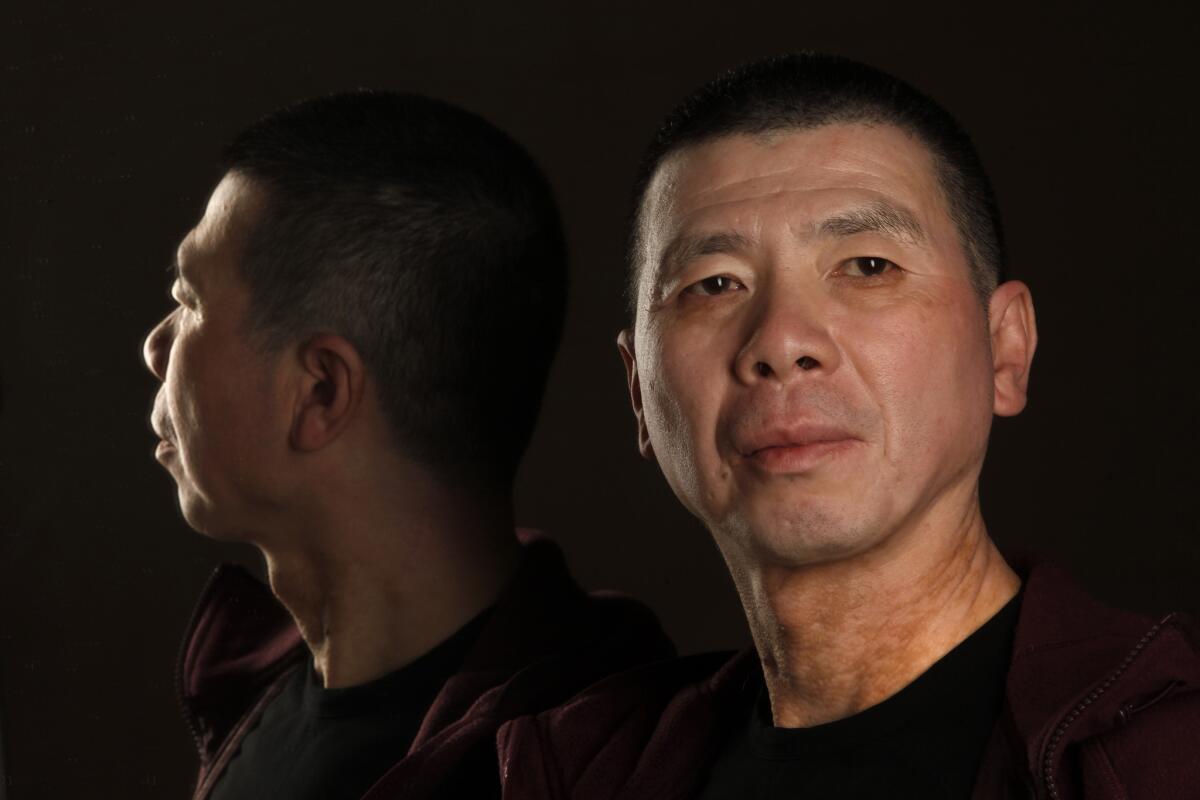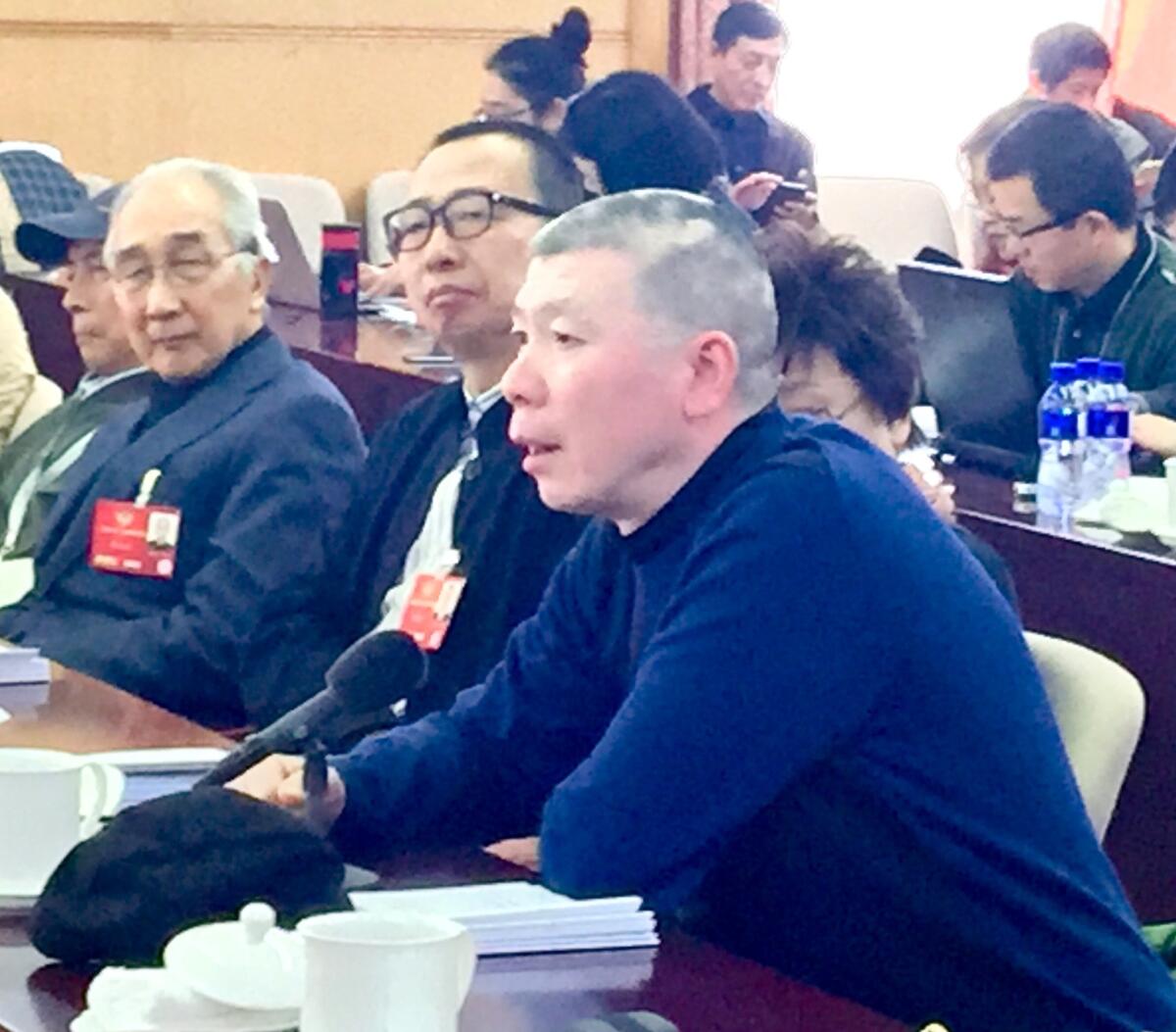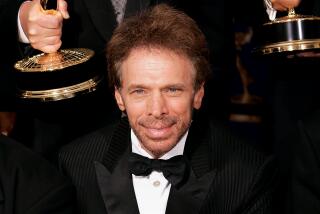Film crews full of ‘farmers’: Top Chinese director decries ‘low quality’ of below-the-line talent

“Although we are going to exceed the U.S. box office in the future, there is still a big gap between us and the states in terms of the quality of film production,” said director Feng Xiaogang.
- Share via
Reporting from Beijing — China’s filmmakers are using “farmers” to staff their makeup, costume and lighting departments, and a dearth of professional training is holding the industry back, prominent director and actor Feng Xiaogang said Monday.
The “low quality” of below-the-line workers is “a big barrier to the development of the Chinese film industry,” Feng told an annual gathering of delegates to the Chinese People’s Political Consultative Conference, an advisory body to the national legislature currently meeting in Beijing.

Director Feng Xiaogang addresses fellow delegates to the Chinese People’s Political Consultative Conference in Beijing.
“Most of the people working in the lighting department are from Henan province,” said Feng, referring to a rural area in central China with a reputation for backwardness. “They are not trained professionally – they got the job simply because they happen to know someone who works on the film crew. … The stage hands, you tell them what kind of scene you want, but they’ve never seen that kind of setting themselves.”
SIGN UP for the free Indie Focus movies newsletter >>
China’s movie industry has boomed over the last five years, with the country building thousands of cinemas and soaring to become the second-largest film market in the world behind only the United States. China’s box office revenue jumped 48% between 2014 and 2015, and the nation’s box office receipts may surpass the United States’ next year.
But China has had little success exporting its films beyond its borders. Feng, who recently starred in the hit “Mr. Six” and is known for directing movies including “If You Are the One,” “Aftershock” and “Back to 1942,” said the industry can’t just measure itself by box office alone.
“Although we are going to exceed the U.S. box office in the future, there is still a big gap between us and the states in terms of the quality of film production,” said Feng, who is a delegate to the CPPCC. The body includes representatives from various industries and sectors; Feng is a member of an arts and culture grouping that also includes prominent film director Chen Kaige and actor Jackie Chan.
Feng said he, along with Chan and actor-director Zhang Guoli, was planning to start a vocational training academy to develop a healthier “base” on a more solid footing. He also said he was thinking of inviting professionals from Hollywood to teach in his academy so that young people could learn from them.
Other delegates from the arts and culture group complained that censorship continues to limit the healthy development of the entertainment industry.
Prominent TV screenwriter Gao Mantang told his CPPCC counterparts that censors’ sensitivity about contemporary issues was resulting in an oversupply of comedic and period TV offerings, as producers and writers shied away from topics that would result in an onerous censorship process.
“If your script is based on reality, and if you touch [even] a little bit on social issues, or you want to talk about things in-depth, the censorship will be very, very difficult,” said Gao, who explained that for one project he had to submit his script to six different government departments for approval.
For example, one project of Gao’s that involved a Chinese man doing business in France had to be submitted to the Ministry of Commerce -- among other government bureaus -- for its endorsement, he explained.
Zhang, the actor-director, said he “totally agreed” with Gao’s comments. “To produce at TV drama, the process from initially seeking approval to final censorship, there are lots of departments involved and each has its own procedure,” said Zhang. “It’s getting more and more difficult these years.”
Zhang said he himself had cut back on TV dramas and had instead turned to reality shows. “Dramas made by people like me do not sell well anymore,” he said. “The things that sell well are costume dramas, and the shows involving fairies and gods.”
Follow @JulieMakLAT for news from China
Nicole Liu in The Times’ Beijing bureau contributed to this report.
More to Read
From the Oscars to the Emmys.
Get the Envelope newsletter for exclusive awards season coverage, behind-the-scenes stories from the Envelope podcast and columnist Glenn Whipp’s must-read analysis.
You may occasionally receive promotional content from the Los Angeles Times.







